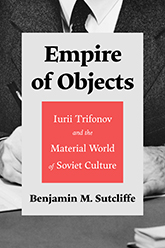|
Empire of Objects
Iurii Trifonov and the Material World of Soviet Culture
Benjamin M. Sutcliffe
“A thorough, rigorous, and focused analysis of the complete oeuvre of one of the most important, yet still underrated, writers of the Soviet period. Empire of Objects not only updates Trifonov scholarship but also addresses some key, long-standing oversights and misapprehensions and makes a substantial contribution to the study of Soviet literature and culture.”
—Polly Jones, University College, Oxford
Although understudied in the West, Iurii Trifonov was a canonical Soviet author whose lifetime spanned nearly the whole of the USSR’s history and who embodied many of its contradictions. The son of a Bolshevik murdered on Stalin’s orders, he wrote his first novel in praise of the dictator’s policies. A lifelong Muscovite, he often set his prose in the Central Asian peripheries of the USSR’s empire. A subtle critic of the communist regime, he nonetheless benefited from privileges doled out by a censorious state.
Scholars have both neglected Trifonov and focused their limited attention only on the author’s most famous works, produced in the 1960s through the 1980s. Yet almost half of his output was written before then. In Empire of Objects, Benjamin M. Sutcliffe takes care to consider the author’s entire oeuvre, revealing how Trifonov’s work reflects the paradoxes of a culture that could neither honestly confront the past nor create a viable future, a culture that alternated between trying to address and attempting to obscure the trauma of Stalinism. The author became increasingly incensed by what he perceived as the erosion of sincerity in public and private life, by the impact of technology, and by the state’s tacit support of greed and materialism. Sutcliffe’s comprehensive overview of Trifonov’s work shows that, though fictional, the oeuvre in sum offers a compelling window into Soviet culture.
Praise
“Sutcliffe’s engaging new study considers the oeuvre of Iurii Trifonov, one of the most talented writers of the late-Stalinist and Thaw-era Soviet Union, and examines his struggle at the convergence of Stalinist ‘sincerity’ and the post-Stalin call to probe the cult of personality and its amorality. An important contribution to the study of late Soviet intellectual and literary life.”
—Edith Clowes, University of Virginia
“A great example of the wider contribution of literature to historians’ understanding of social and cultural realities. . . . A useful resource for anyone interested in Russian and post-Soviet studies and the relation between consumption, materiality, morality, and corporeality.”
—H-Net Reviews
“An essential resource for scholars interested in the life and writing of Yuri Trifonov. . . . [Introduces] readers to texts and contexts that are typically overlooked. The result is a portrait of both Trifonov’s writing and, more broadly, the cultural politics of everyday life in the post-Stalin Soviet Union. Highly recommended.”
—Choice Reviews
Table of Contents
Contents
Acknowledgments
Introduction: The Unknown Trifonov
1 A Radiant Future of Things: Trifonov’s Stalin-Era Prose
2 Enthusiasm and Ambivalence: Trifonov and the Thaw
3 Empire of Objects: Sincerity and Consumption in the 1970s
4 Utopia Lost: Sincerity and the Past in Trifonov’s Final Works
Conclusion: Echoes of Trifonov and Soviet Culture
Notes
Bibliography
Index
|

Larger images
November 2023
170 pp. 6 x 9
|

